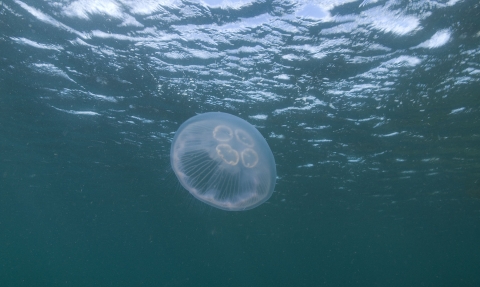
Moon jellyfish © Paul Naylor
Dorset Jellyfish
Discover Dorset's jellyfish
Most jellyfish are seen inshore during the spring and summer. During April, longer sunny days, warmer sea temperatures and an upwelling of the nutrients from the depth of the water column, create an increase of microscopic plants and animals, known as the spring plankton bloom. This fabulous food source is the main diet for many marine species and this bloom, along with a mild winter, creates the perfect conditions for jellyfish to flourish.
ID guide to common jellyfish seen around the Dorset coast
Species recorded in Dorset
Eight jellyfish species have been recorded throughout Dorset with frequent sightings of the compass, moon, blue and barrel jellyfish in the spring and summer. On occasion, these have included swarms.
The barrel jellyfish is one of the largest we see in Dorset. Odd sightings of these have occurred over the last few decades but this changed in May 2014, when swarms appeared along the South Coast. Similar numbers have been reported throughout spring and summer 2015.
Barrel Jellyfish, which grow up to an impressive 1 metre wide and weigh 25kg, can give a mild sting, even when dead. Dorset Wildlife Trust (DWT) is advising members of the public not to touch any jellyfish they find and to send in photos of the sighting. These are essential to aid identification particularly as jellyfish change colour, shape and size when stranded.
Jellyfish swarms could entice more marine life
The leatherback turtle and the oceanic sunfish have been known to visit Dorset. Whilst confirmed sightings of the leatherback are uncommon, sunfish are often reported in the summer. Both of these species are attracted to the South Coast in pursuit of their favourite food. An increase in jellyfish numbers is likely to improve the chance of seeing these impressive megafauna and averaging at 2m in length, that would be quite a sighting. Keep your eyes peeled!
Health and Safety - what should I do if I get stung?
Please remember to look but don't touch - jellyfish are capable of stinging even when stranded dead on the shore. Remember to keep dogs away too. Some species such as the Portuguese man o'war are known to cause a painful sting but are rarely deadly.
If you have been stung by a jellyfish, seek medical advice! The NHS provide full details on the prevention, symptoms and treatment of a jellyfish sting HERE.
Report a jellyfish sighting
Tweet us your sightings and photo using #dorsetjellyfish to @DWTMarine or contact us on Facebook. You can also email us kimmeridge@dorsetwildlifetrust.org.uk


